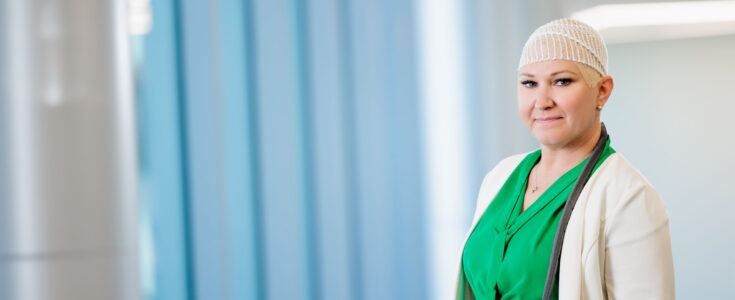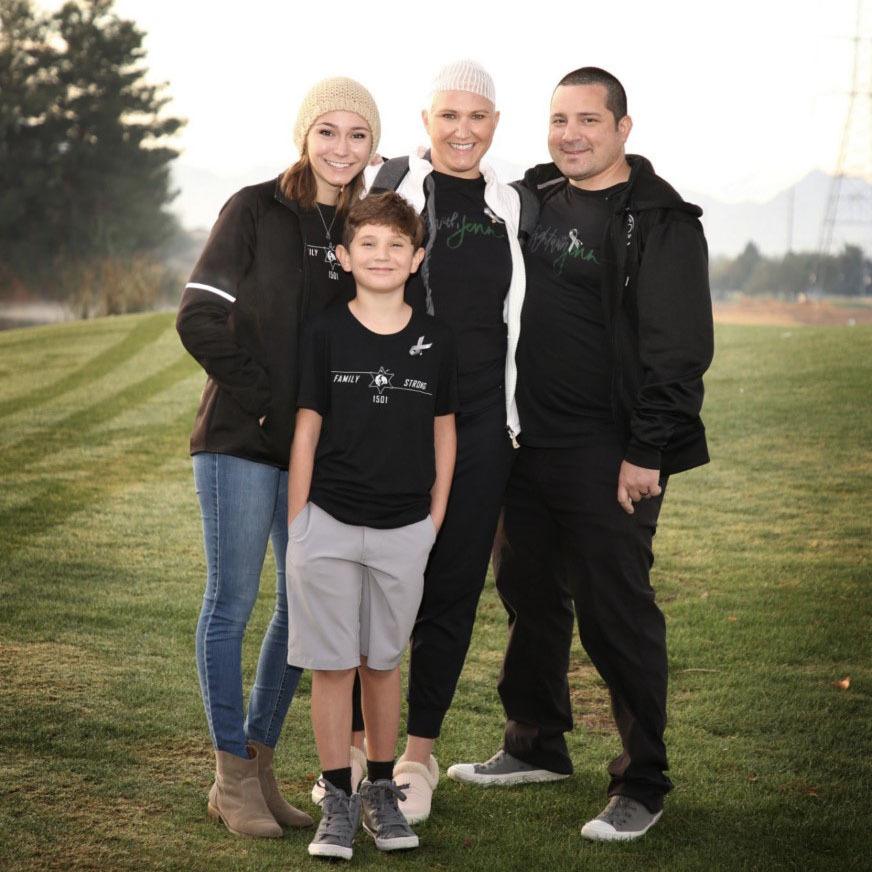
Ivy Blog
Fighting Brain Cancer – A Glioblastoma Story
- April 25, 2023
- Ivy Center
- Posted in Patient Stories

When faced with the news that she’d need brain surgery to remove a glioblastoma brain tumor, the most deadly form of brain cancer, Jenn Ortiz had just one question for the doctor, “Will I still be funny?”
Humor is her love language. Jenn’s goal is to make you laugh, and anyone else in the room, even if it’s at her own expense.
“I have brain cancer,” she’ll say jokingly to excuse a mistake or a moment of forgetfulness.

Despite her light-hearted spirit, Jenn knows glioblastoma is no laughing matter and she’s determined to beat it.
Jenn was diagnosed with brain cancer in August 2020. She learned glioblastoma was the most aggressive and deadly form of brain cancer and that she may have only 12-15 months to live. She allowed one tear to roll down her cheek, then said, “no, not me.”
She would fight it. Jenn lost her parents too soon and she would not let her own two children experience that loss.
“We’re fighters in this family,” Jenn says.
Getting the Brain Cancer Diagnosis
Months earlier, Jenn says she felt off. She began experiencing a strange numbness on her left side. The sensation would begin in her hand and roll up her arm. The same feeling was happening in her left foot and leg. The episodes would force her to stop and catch her breath. In August 2020, after a family bike ride, it happened again but more intensely this time. Her left hand and foot curled in and the left corner of her mouth pulled back towards her ear. She was having a focal aware seizure.
Her husband, Matt, quickly dialed 911. Jenn remembers his directions to her son to unlock the front door for paramedics. She remembers the line of first responders’ boots standing around her.
An MRI revealed a large brain tumor on the right side of her brain. Plans for surgery were quickly put into place.
A successful surgery removed the tumor and Jenn began a six-month treatment protocol of radiation and chemotherapy. She was beginning to feel back to normal when, in August 2022, Jenn had another seizure. She says she knew the tumor had come back. Still, the news was devastating.
“The rug was ripped out from under me,” Jenn says.
Looking to an Experimental Treatment
Glioblastoma brain tumors often recur and Jenn was prepared for that possibility. For those with recurrent glioblastoma, treatment options are very limited, and there is no standard therapy. Not one to take “no” for an answer, Jenn looked for alternatives and found a Phase 0 clinical trial at the Ivy Brain Tumor Center.
The clinical trial was testing a new drug, AZD1390, which can make tumor cells more vulnerable to radiation therapy. Jenn took the drug for three days before her surgery to remove the tumor. Her neurosurgeon, Dr. Nader Sanai, removed the brain tumor and the Ivy Center’s team of scientists quickly tested it to see if the drug had reached the tumor and had its intended effect. It did. Jenn continued taking the drug during treatment.
“Unfortunately, for those with high-grade gliomas, the battle is never over,” says Dr. Sanai, director of the Ivy Brain Tumor Center and director of Neurosurgical Oncology at Barrow Neurological Institute. “We’re singularly focused on finding a cure for these aggressive tumors, and Phase 0 clinical trials, like the one Jenn participated in, give us a direct avenue for rapid drug discovery.”
Jenn’s latest tests and MRI show no signs of brain tumor regrowth. Jenn credits her care team and the clinical trial for saving her life.
“I’ll do any trial or anything I can do to save my life and anyone else’s,” she says.
Life After Brain Cancer
Today, Jenn feels back to her old self, although she has some neurological deficits to manage. Before brain cancer, Jenn says she was sharp as a tack and had a good memory — she never needed to take notes. After surgery and treatment, comprehension and articulation have become challenging and her short-term memory has been impacted.
In her typical, never-give-up attitude, Jenn doesn’t allow family and friends to help her remember. Once at an aquarium, she couldn’t think of the name of the fish that could potentially eat a person. The word finally came to her hours later, a piranha, she remembers. She retraces her steps and writes notes to herself to help her remember.

Jenn worked with physical therapists to recover many of her motor skills that were affected. She also started practicing yoga to improve her balance. For tips on recovering quickly after brain surgery, click here.
Her goal now is to do everything in her power to prevent another recurrence.
“I got a third chance at life and I’m not wasting it,” she says. “I’ve got too much to live for.”
Jenn lost her hair during radiation and has decided to keep shaving her head so she can wear an Optune device. Optune is a wearable, portable, FDA-approved device that sends electric Tumor Treating Fields (TTFields) to tumor tissue to disrupt cancer cell division and growth.
She’s also changed her diet. She eats foods that support brain health and avoids sugar and simple carbs. She takes fish oil supplements and exercises daily. Although she’d never turn down a chance to share french fries with her son. It’s an 80/20 balance, she says.
After her first round of brain surgery and treatment, Jenn found herself taking more naps and eating foods that weren’t healthy because she had cancer, after all. She says she allowed herself to become physically and emotionally lazy. When her brain tumor came back, those excuses, she says, weren’t acceptable.
“I’m not sick, I have a diagnosis,” Jenn says.
Brain Cancer Blessings
Although her husband hates when she says it, Jenn believes brain cancer has been a blessing. It’s made her refocus on what’s important. She’s there when her son gets home from school and is always available to talk when her daughter calls from Oklahoma, where she’s in school to become a veterinarian. The family decided to buy a travel trailer so they could get out and make memories together.
Jenn’s advice to others on a brain cancer journey:
“First, find a therapist and talk through this. It’s heavy stuff,” she says. “Then have a bucket list and just do it. Find something to be passionate about. Find new ways to bring joy to your life.”

This story is for general health information only and is not meant to be used as medical advice, diagnosis or treatment. Please consult your physician or healthcare provider before beginning any treatment protocol or with any questions. This story reflects the health status of this particular patient at the time the story was written and photographs were taken. The patient’s condition may have changed over time.
